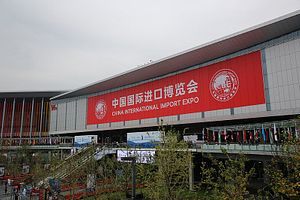Shanghai is hosting the second annual China International Import Expo (CIIE) from November 5 to November 10, a national-level trade show focused on imports. The event is co-hosted by China’s Ministry of Commerce and the Shanghai Municipal Government. This year, distinguished guests included French President Emmanuel Macron, Jamaican Prime Minister Andrew Holness, Greek Prime Minister Kyriakos Mitsotakis, and Serbian Prime Minister Ana Brnabic, who were photographed with China’s Xi Jinping at a banquet the evening before the opening.
Delegations from more than 150 countries and more than two dozen international organizations (including the World Trade Organization, United Nations Development Program, United Nations Conference on Trade and Development, Food and Agriculture Organization of the United Nations, United Nations Industrial Development Organization, and the International Trade Center) have flocked to China’s financial center for the event. Close to 4,000 companies from around the world are in attendance and organizers estimated the CIIE would attract an estimated half a million buyers and visitors. Among them are nearly 200 U.S. firms, including John Deere, General Motors, Tesla, Ford, Honeywell International, GE, and Thermo Fisher Scientific, despite the lingering trade tensions between Washington and Beijing.
The expo, launched by Xi Jinping at the first Belt and Road Forum in 2017 in Beijing, is but one of a number of initiatives intended to bolster the future prospects of China’s economic growth and to boost its imports. Trade has been a critical component of China’s economic rise, accounting for more than 38 percent of the country’s GDP in 2018 (down from a peak of more than 64 percent in 2006, according to World Bank data). Imports of goods and services, which represented more than 18 percent of China’s GDP in 2018, remain a potential source of growth as China’s overall economic forecasts have begun to contract from the double digit growth it once experienced from the reform and opening policies of the late 1970s through the 2000s.
With a population of more than 1.3 billion people and a growing consumer market, firms are eager to gain market access. China also touts that it has a potential to develop into a $10 trillion import market. The CIIE markets itself as an expo providing new channels to promote trade liberalization, economic cooperation, and the opening of the Chinese market. The expansive center includes exhibitions dedicated to trade in services, automobiles, science and technology, medical equipment and health products, as well as food and agricultural products, among others.
Xi delivered the trade show’s opening address. Much like Xi’s message at the inaugural gathering in 2018, China’s president doubled down on the power of globalization processes and advocated for creating a more open, integrated, and cooperative world economy. “Economic globalization represents the trend of history. Like the world’s great rivers, the Yangtze, the Nile, the Amazon, and the Danube – they all surge forward in relentless flow, and nothing can stop their mighty movement,” said Xi. He then emphasized the importance and value of multilateral cooperation, calling on partners to “join hands” and “tear down walls.” Xi also committed to further opening the Chinese market, enacting structural changes, and facilitating doing business in China: “China will open its door only wider to the world.”
Xi also took the opportunity to praise China’s role in supporting global economic development notably through his staple Belt and Road Initiative, and the recent conclusion of negotiations for the Regional Comprehensive Economic Partnership (RCEP). Unsurprisingly, Xi’s address also echoed a number of the dominant Chinese narratives about the country and the international system: that China plays a crucial role in contributing to the prosperity of the global economy and international peace and stability.
Separately, Macron and Xi held a bilateral visit on the sidelines of the expo, making deals worth an estimated $15 billion in aeronautics, energy, and agriculture, including approval for 20 French firms to export beef, pork, and poultry to China.
The expo is not purely a benevolent endeavor. The CIIE, along with the recent expansion of the Shanghai Free Trade Zone and other pilot projects in other provinces, changes at the Shanghai Stock Exchange, and the passing of a new foreign investment law (set to enter into in January 2020), are designed to further open the Chinese economy and market and to inject new lifeblood into the economy. Collaborative rhetoric and the sheer scale of the CIIE may be attractive, as are China’s calls for multilateral cooperation. However, some skepticism lingers across the business community about the degree of openness in the Chinese market and concerns about the overall deterioration of the business environment are unlikely to dissipate overnight.

































